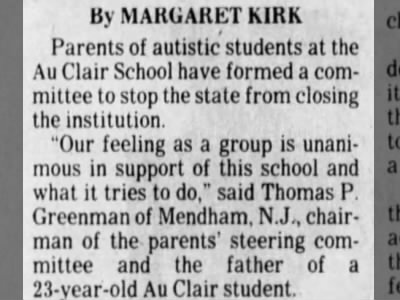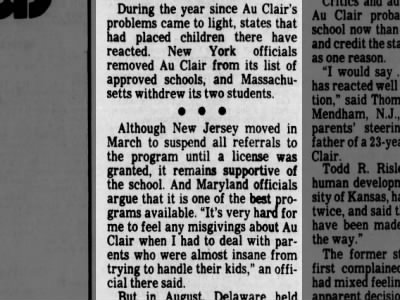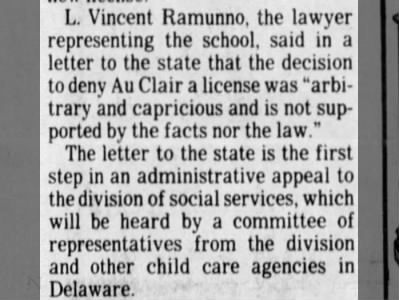 10/18/1979 NJ - The State's decision to deny Au Clair a license for the second time did nothing to end the controversy or close the school. Several parents began exploring legal action against the state for "unnecessary interference in their children's welfare." While sifting through future articles never produced any evidence that such a suit was filed, it did reveal Au Clair had a long, quiet road yet to travel with several states deeply vested in the outcome.
10/18/1979 NJ - The State's decision to deny Au Clair a license for the second time did nothing to end the controversy or close the school. Several parents began exploring legal action against the state for "unnecessary interference in their children's welfare." While sifting through future articles never produced any evidence that such a suit was filed, it did reveal Au Clair had a long, quiet road yet to travel with several states deeply vested in the outcome. While Rammano insisted that Ken Mazik would come out fighting, Mazik never made a spoke publicly. He existed quietly in the shadows and let his attorney, his Au Clair parents, his sending states be the official voice of the battle for Au Clair.
While Rammano insisted that Ken Mazik would come out fighting, Mazik never made a spoke publicly. He existed quietly in the shadows and let his attorney, his Au Clair parents, his sending states be the official voice of the battle for Au Clair.  On October 30, 1979, Rammuno filed the first step to an administrative appeal: The Arbitrary and Capricious Clause, defined by Wikipedia as "doing something according to one’s will or caprice and therefore conveying a notion of a tendency to abuse the possession of power." This clause is a legal lynchpin. I knew that before I devolved to Wikipedia as a legitimate source. In most legal administrative procedures appeals can only be filed under these three little words and the filing party is tasked with proving that an action by a public body was "arbitrary and capricious" in order for their appeal to move forward. "Arbitrary and Capricious" is so important to our legal system that it made its way into Title 14, Chapter 1 of the education code that governs our state.
On October 30, 1979, Rammuno filed the first step to an administrative appeal: The Arbitrary and Capricious Clause, defined by Wikipedia as "doing something according to one’s will or caprice and therefore conveying a notion of a tendency to abuse the possession of power." This clause is a legal lynchpin. I knew that before I devolved to Wikipedia as a legitimate source. In most legal administrative procedures appeals can only be filed under these three little words and the filing party is tasked with proving that an action by a public body was "arbitrary and capricious" in order for their appeal to move forward. "Arbitrary and Capricious" is so important to our legal system that it made its way into Title 14, Chapter 1 of the education code that governs our state.Rammuno also demanded that the state turn over all files so that Au Clair could determine the exact allegations against the school. Finally, in March of 1980, after several negotiations, the state announced that it would reconsider Au Clair's licensing application. Despite losing its license nine months prior, Au Clair had been permitted to continue to operate. Finally, the school had reached an agreement with the state - it would drop its appeal if the state agreed to re-evaluate the school and the changes that had occurred in the five months previous:
- The hiring of an independent program director
- Increased staffing
- Organized two outside review committees
- Collaborated with experts on how to improve its program
- Raised tuition from $18,000 to $26,000 to financially support the new changes to the school's programming.
That should have been the end of the story.






0 comments:
Post a Comment
Word Verification May Be Case Sensitive